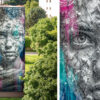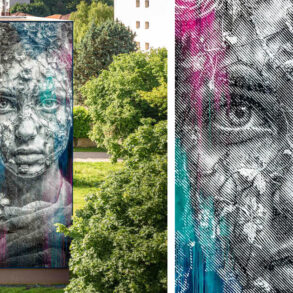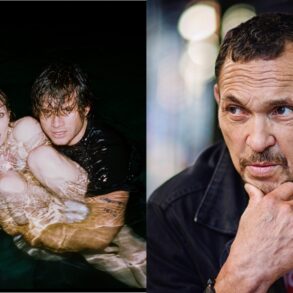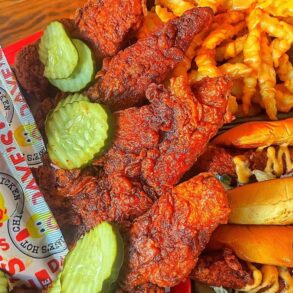Claudia “Claw Money” Gold is the most influential graffiti artist you’ve never heard of — but you’ve probably seen her work.
In the more than 35 years since she scribbled her first piece of graffiti, Claw has managed to take her tag off the streets and into the mainstream.
Claudia “Claw Money” Gold has launched an exhibition in Warrnambool. (ABC News: Olivia Sanders)
Claw’s work has been featured in films, books, exhibits, and murals across the globe — while pieces from her name-sake fashion label have been seen on the likes of Kendrick Lamar, Amy Winehouse, and Rihanna.
Now, a solo exhibition by the New York native has launched in Australia.
Claudia ‘Claw Money’ Gold at her Warrnambool Art Gallery exhibit. (ABC News: Olivia Sanders)
A swanky Manhattan art museum or an obscure Brooklyn gallery would be the obvious choice to showcase the original exhibition, or perhaps a street art epicentre like Melbourne.
Instead, a coastal town of 30,000 people in Victoria’s south-west has managed to snag the exclusive.
When asked, “Why Warrnambool?”, Claw gives little explanation beyond, “Why not?”
It’s unexpected — but then so is she.
Elements of New York City’s streetscape are incorporated into the Claw Money World exhibition, in homage to Claw’s upbringing. (ABC News: Olivia Sanders)
Claw Money World
The exhibition, Claw Money World, features works guiding the viewer through her career and the development of her art — from a 17-year-old scrawling spray paint on subway train cars to collaborations with the likes of the New York Yankees.
It all began with a W that needed a little oomph.
The claw has featured on New York metro cards, poker chips, and baseball cards. (ABC News: Olivia Sanders)
“I wrote my name on the wall, next to other people, it didn’t look that good,” Claw says.
“I used to write, ‘Claw was here’ over and over, but the W was attached to the ‘was’, like ClaWas here.”
The W quickly became the claw, then it wasn’t long before Claw realised other graffiti artists would come along and paint over all the other letters, leaving just the claw.
Claw’s art is cute but vicious, and resonates across generations, sub-cultures, aesthetics — so much so that many of the biggest global brands have wanted in on the profit, including NASCAR, Calvin Klein, My Little Pony and UGG Australia.
Claw has collaborated with some of the world’s biggest brands spanning across consumer markets. (ABC News: Olivia Sanders)
Embracing femininity
Claw Money World is full of bright-bubble style graffiti and countless fierce claws — two seemingly opposing feminine ideals that have been weaved through Claw’s work from the very beginning.
In the early days of her career, Claw would sometimes don a prom dress while she painted on the street.
It was a kind of escape apparel, leveraging the gendered assumptions that surround the graffiti art form.
Claw stands with a cutout of her younger self and a New York subway train car. (ABC News: Olivia Sanders)
“I would dress sort of in a hyper-feminine way, when somebody would see me painting, I would turn around and say, ‘You didn’t see anything’ and run off,” Claw says.
“It was shocking and it really worked, this ironic juxtaposition — using ‘what a woman is’ to hide what I was doing.”
She wasn’t trying to make a statement, just a quick getaway. In those first few years of painting graffiti, Claw says gender didn’t cross her mind.
“I’ve been interviewed a lot for different female-themed books and films, and there’s this thread of, ‘Oh [men] don’t accept us’, but … I feel like I have been pushed up almost on the shoulders of men,” Claw says.
“Being a woman in this culture has been the best.”
By the early 2000s Claw was being asked to sit for interviews, participate in documentaries, and have her work featured in books — but she hesitated, knowing putting her face to her work would mean no more illegal graffiti.
Pieces from Claw’s eponymous fashion label have been seen on the likes of Amy Winhouse, Rihanna, and Kendrick Lamar. (ABC News: Olivia Sanders)
“My friends said to me, ‘It’s time. What haven’t you done that you need to do?’,” Claw says.
“You need to let young girls know that it’s you. Just saying it’s a woman doing it isn’t enough, they have to see you.'”
Self expression
It’s been more than 17 years since Claw scrawled her last piece of illegal graffiti, but her work remains rooted in the culture.
Her whole brand and career has been built on the very thing every graffiti artist has: a tag, like a signature in the graffiti world.
With it, Claw has managed to take what is still a largely maligned art form and make it not just palatable but profitable.
Claw Money World will be on exhibit at the Warrnambool Art Gallery until March 2025. (ABC News: Olivia Sanders)
“Graffiti is a secret code, written for other graffiti writers, it’s not really meant for public consumption,” Claw says.
“But I changed the way I viewed it, I felt like it is for public consumption because it isn’t letters.”
Claw says she realised the power of her tag when her friends started having children.
“They could barely talk but they would see a claw on the wall and say, ‘Claw paw’,” she says.
“I realised this is really digestible in the brain without asking too much.
A collection of Claw’s artwork featured at the Warrnambool Art Gallery. (ABC News: Olivia Sanders)
“There’s something familiar about it, like a mammal paw.”
The claw is a signature, a marking of territory, a symbol that taps into the innately human desire to tell the world: ‘I was here’.
“Graffiti is a very human expression, we were doing it in the caves,” Claw says.
“It is a bit like dog pissing, territorial — but I think it’s more that people feel invisible.
“At least I did. I felt very invisible until I started writing graffiti.”
This post was originally published on this site be sure to check out more of their content.








